“This is the only way forward from here!” Nabhya pleaded with the blue skinned mercenary standing in the middle of the road. The man spat words back at him from beneath a layer of bandages. “This path belongs to my employer for his private use.” He tightened his grip on his rifle.
I stepped forward with my hands outstretched in a welcoming gesture, taking a few steps past Nabhya. “Our people are starving, the next market is a day’s travel down this valley. Please, is there anything we can do to convince you to let us pass? We have batteries we could—” The mercenary raised his rifle lightning quick, “I already said no one can come through here! I won’t be repeating myself a third time.” He whistled loudly as I heard the sound of a pistol cocking behind me. I turned to see Nabhya with his gun trained on the mercenary, as figures begin to emerge from the boulders surrounding the valley pass. I yelled for the rest of the convoy to attack. Once again, violence was the only way forward.
Nowhere Prophet is a roguelike deckbuilder which released for PC on July 19. Similar to Slay the Spire, you start with a pre-made deck of cards that you can add to as you, as the titular Prophet, and your followers travel across the desert world of Soma looking for the mystical Crypt, a source of power that could shape the future of the entire planet. The game’s creators call it a “dust-punk” setting—think Mad Max, but replace the cars with advanced technology, and add India as it’s cultural and religious touchstone.
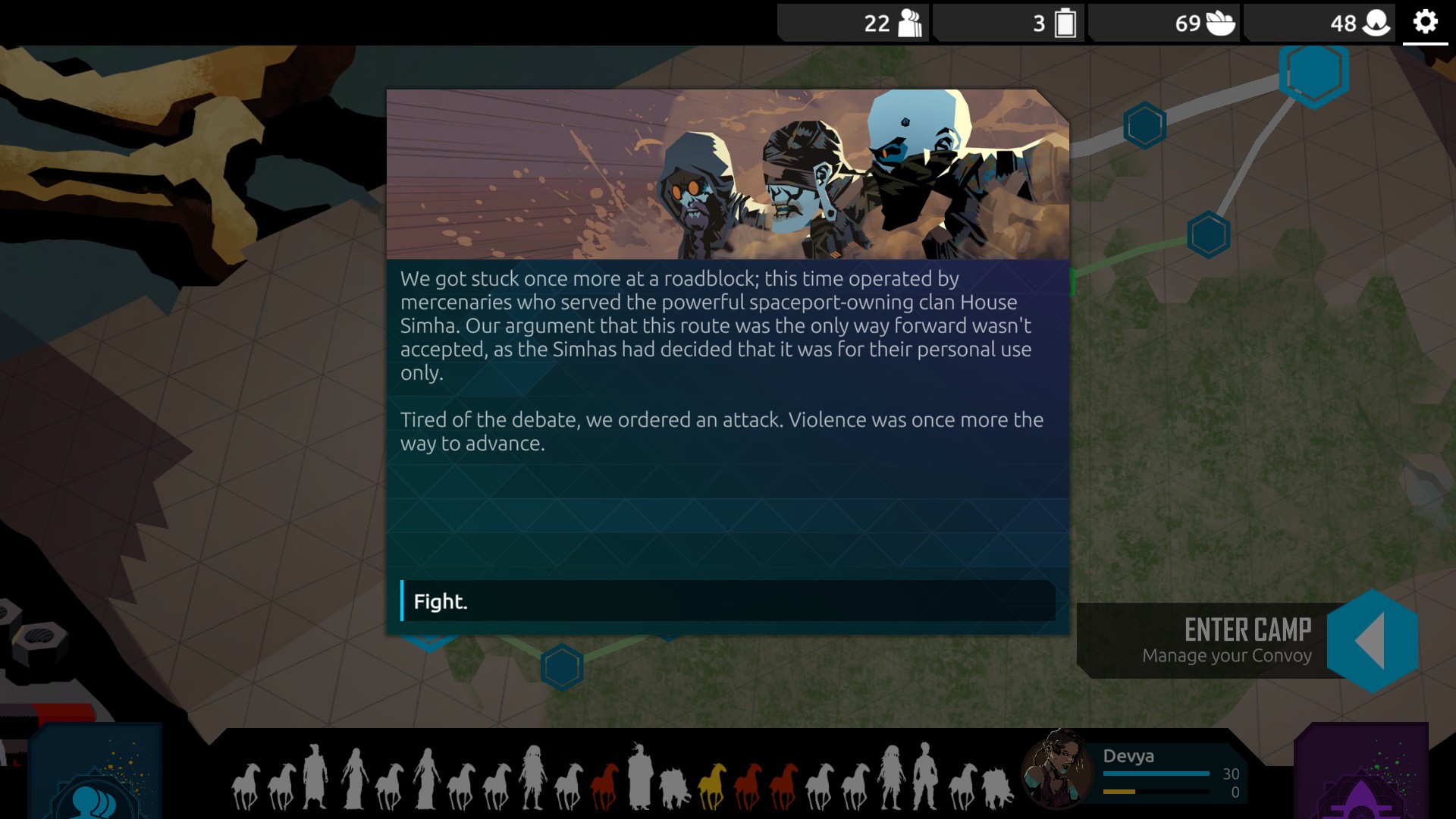
On your journey you’ll have to contend both with the environment and other people, most of them belonging to one of the game’s ten factions, groups with distinct beliefs that also have mechanical differences that reflect each faction’s identity. Nowhere Prophet’s mechanics and narrative come together in a way that bring its setting and values to life, and gives you enough narrative footholds to where, should you want to, you can weave more elaborate scenarios (as I’ve done in the excerpts throughout this review). This can help keep each run fresh, because even if you’ve seen an event before, the surrounding narrative that’s been built on that specific run can give it a very different flavor even the tenth time around.
When you start the game you are shown a map consisting of a series of branching paths with different nodes. In order to move from node to node you need both Food and Hope, resources that can be gained through trade, combat, and random events that happen along your travels. Moving between each node takes 4 days, and each day uses 2 food and 1 hope. If you run out of either of these you start taking damage, and your followers will start leaving your convoy.
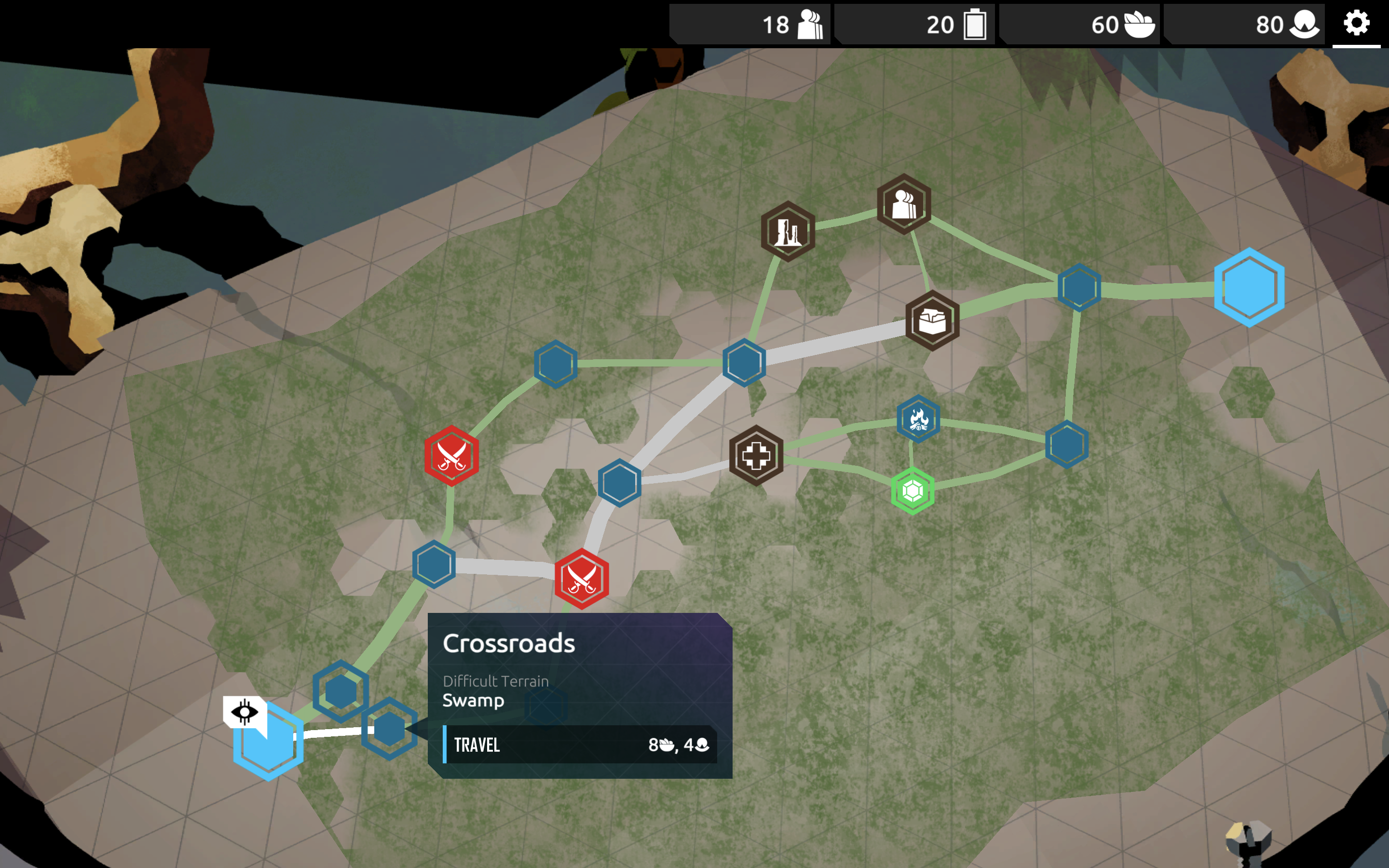
Each day also has a chance of putting you into a random event. Sometimes these throw you directly into combat, sometimes they’re small bits of narrative with no mechanical influence but which add a touch of flavor to Soma and your followers. Sometimes, though, these encounters give you a choice to make. These encounters are the most interesting and varied moments from run to run. They not only shape the identity of you and your Convoy, but also give and take resources much more drastically than combat, and they’re the only source of “mindsets,” a resource meant to differentiate the values you and your convoy espouse on your journey.
For example, you come upon two groups from different factions fighting. Do you join on one side or the other, or do you try to make your way around the skirmish? The option to avoid the fight is marked as “(Risky),” which lets you know when there’s a good chance your attempt might fail and you’ll be embroiled in the fight regardless. At times you’ll have options based on one of three “mindsets” you can gain: Scholar, Believer, or Altruistic. If you have a certain amount of one mindset you’ll have an extra option that lines up with the values of that mindset. There are also times when having a follower from a specific faction will open up a totally new path. Having a certain amount of “Altruism,”for instance, may open up the option to act as a mediator for either group, or having a follower from one of the factions may give you a bonus if you enter combat on that group’s side.
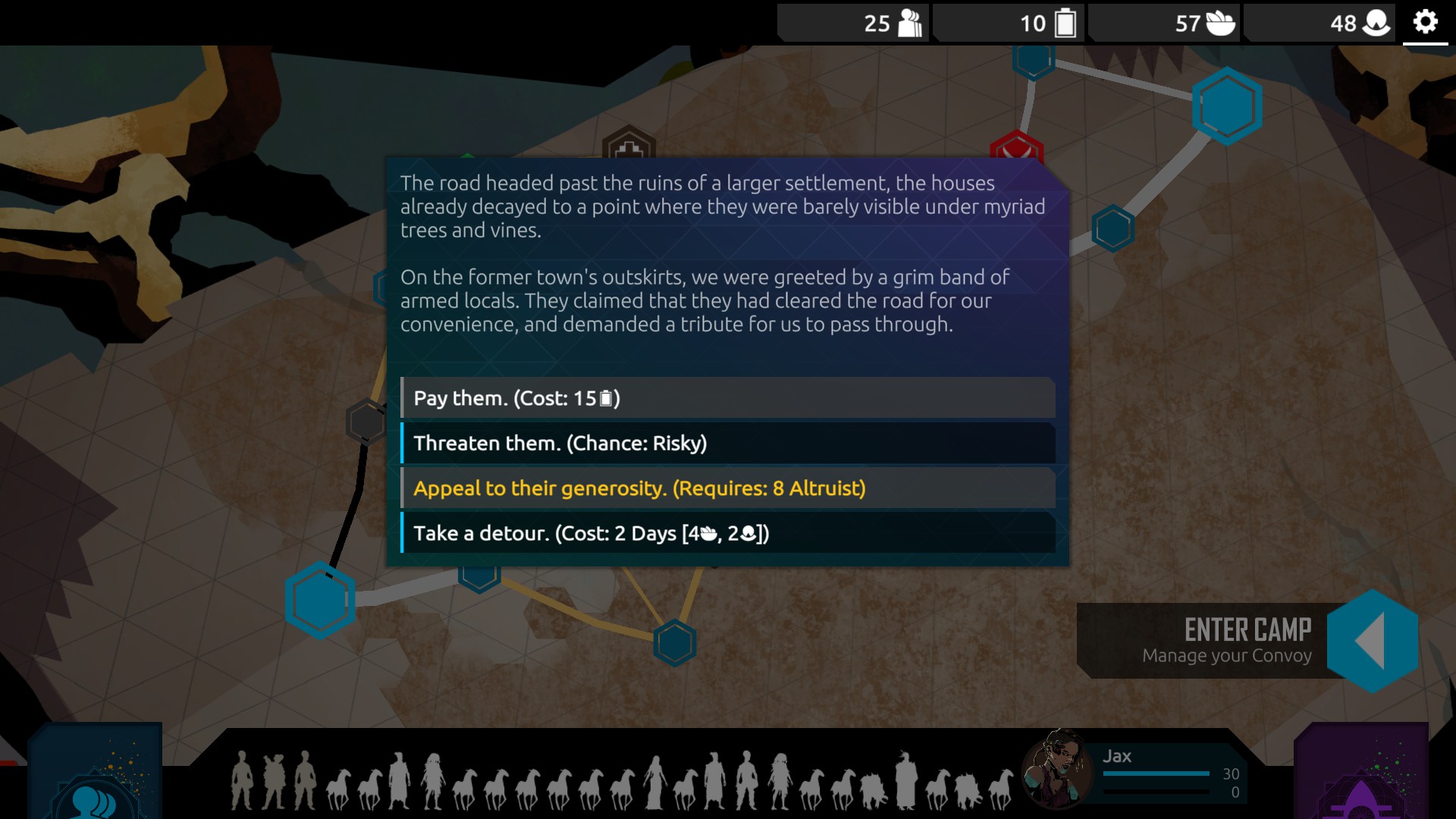
All of these traveling mechanics, from the choices you’re forced to confront, to the scarcity of resources, paint the world of Nowhere Prophet as a harsh one where survival isn’t easy, and the environment is just as likely to kill you as another person is.
Thankfully, despite the cruel world, there are a number of events where you can act altruistically, even if it comes with a price. These small moments of calm are a welcome respite from the otherwise constantly oppressive encounters, and give a glimmer of hope (sometimes literally) in what could’ve been another bland world with a “kill or be killed” black and white ethos. This game takes that sort of world and says that while it may be difficult, the ultimate truth isn’t that “Hope is for the naive and weak,” as the game proclaims in it’s opening cinematic. But that living altruistically in the face of such oppression can be a radical act, that never giving in to the world’s demands of violence won’t preclude you from forging a path towards your goal.
One big difference between Nowhere Prophet and other roguelike deckbuilders is the combat. You have two decks you use simultaneously in combat, the Convoy and Leader decks, and play takes place on a grid where you play your units. The Leader deck represents the actions you can take as an Operator, the name of the technologically gifted people that comprise the different classes you can pick at the beginning of a run. They can move your followers, deal direct damage to enemy units and leaders, and buff and debuff the units on the board.
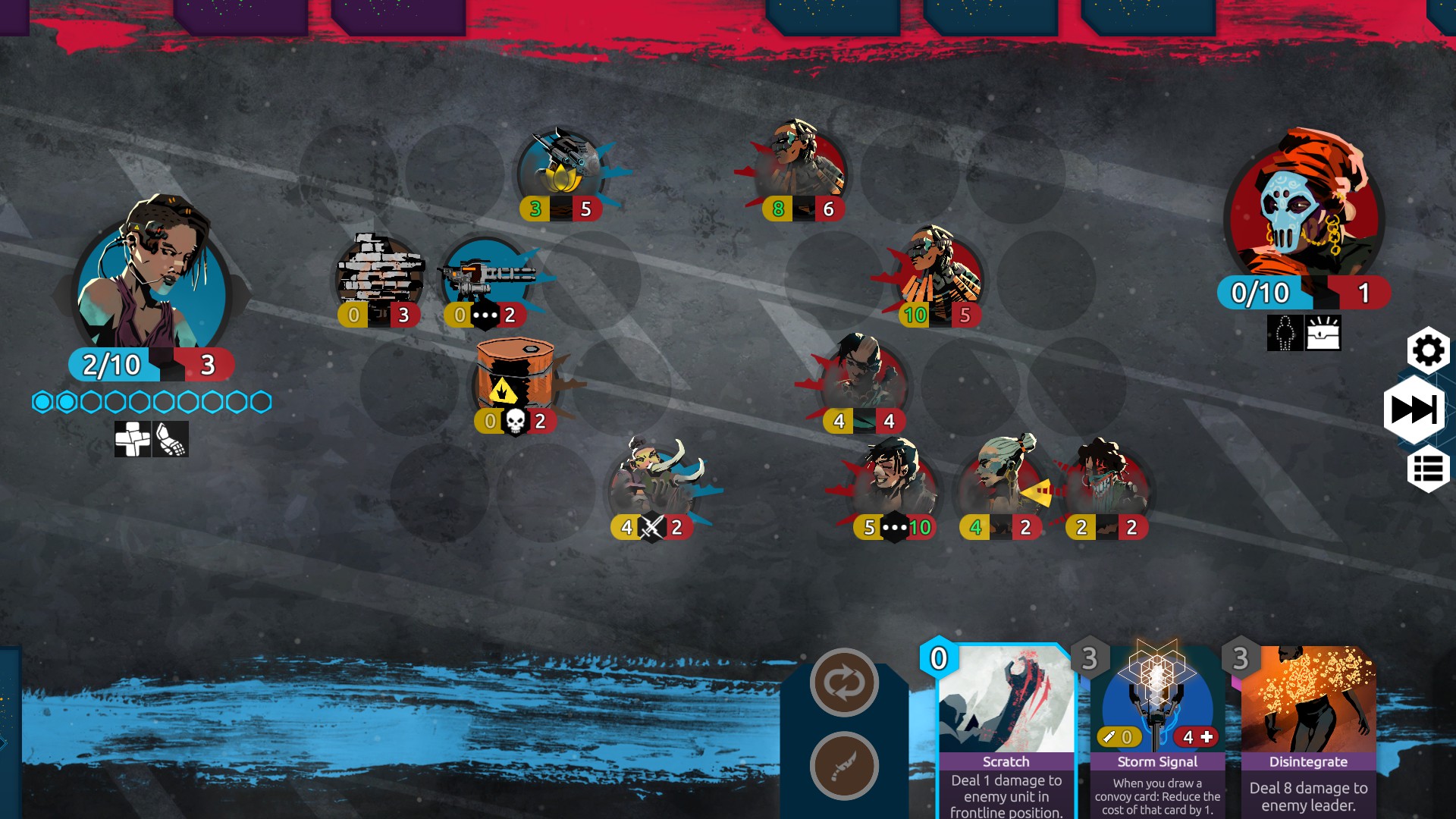
The Convoy deck is made up of your followers, different people and creatures from across Soma that are associated with one of the factions that vie for power and resources. (Each of these factions not only have certain abilities tied to their followers, but also backstories and a general description of their ideology). Each turn each of your followers can take one action, either attack or move across the board. The grid based positioning system gives combat an extra tactical layer that is really fun to play around with, especially since a lot of the Leader cards will often interact with follower placement.
Each follower has an attack and health amount, and some have special abilities, too. When a follower loses all their health in battle, they recieve a wound. Wounded followers have one less health and also cost one less energy to play, but if they’re brought down to zero health again they die for good.
The air was suddenly thick with gunfire and sand. I shot blindly at the mercenaries and rushed to cover as Naybha charged towards the merc leader. The fight was over in seconds. The dust had barely begun to settle as II called out to Naybha. There was no response. I stood up and re-holstered my gun. His body lay lifeless in the road ahead of me. The dead bodies of our enemies littered the area.
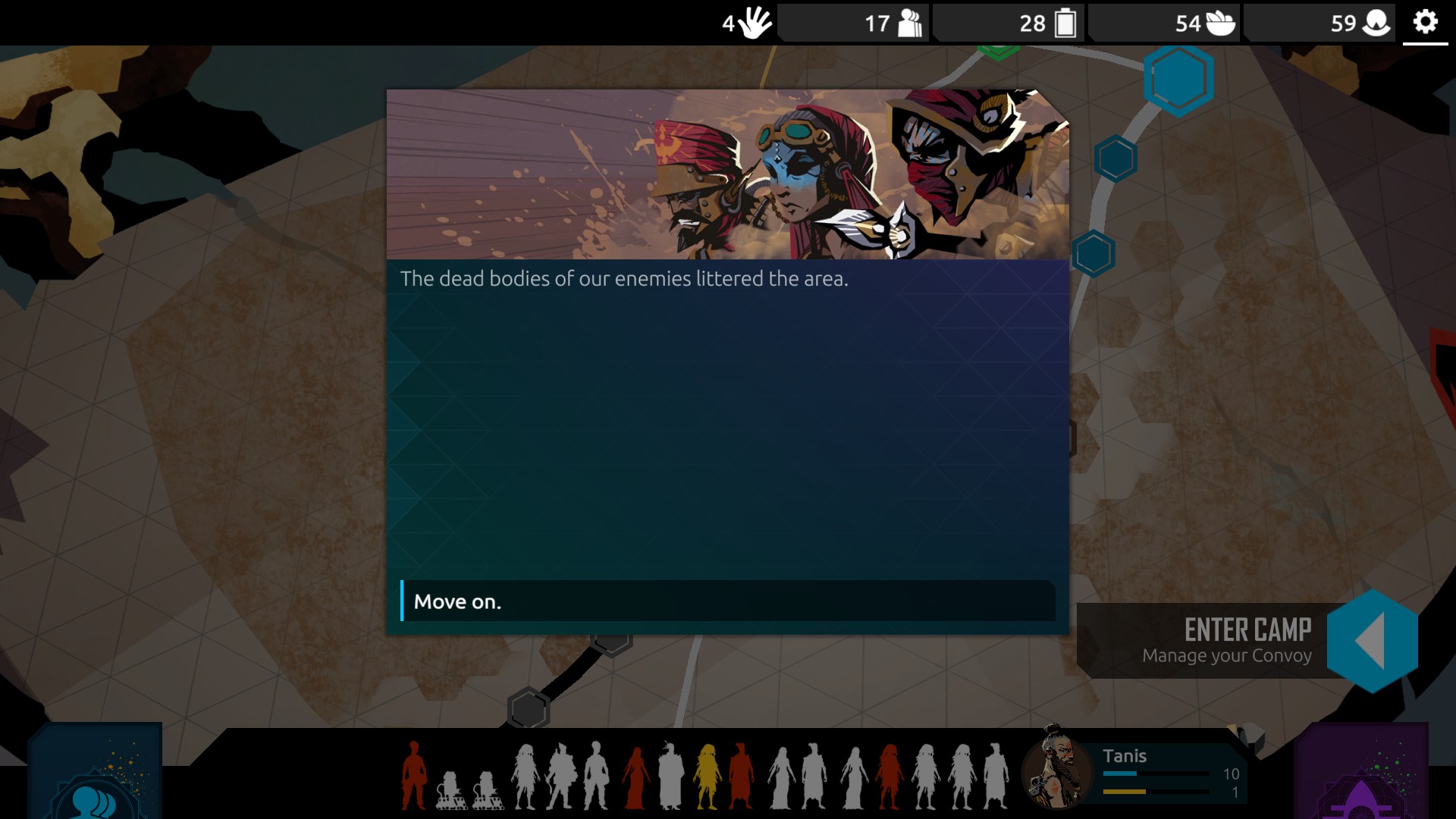
There are ways to heal followers but they are generally few and far between, so you really have to be careful when deciding who to include in your convoy deck. Between permadeath and your followers appearing in the game’s scripted and random narrative events, you get a great sense of these cards as people. Where often in card games your units are expendable to a certain extent, Nowhere Prophet tries its best to give your cards a sense of personhood that will make the decisions you make in combat that much more fraught.
As you move through the world, most of your convoy’s story orbits around your interactions with the game’s major factions.
Unfortunately, two of the factions, The Union and Ferals, are a blemish on what is otherwise solid writing throughout the rest of the game. The Ferals are a group of nomadic tribes whose name and description are of a kind with calling indigenous peoples “savages.” Fortunately, in game they have a variety of interactions that lean away from this characterization, but that only serves as a bandaid . The same can’t be said for The Union, a group described as an ex-mining colony turned city-state, and whose name seems like an obvious reference to workers unions of today. In game however, they are presented as fascistic, and willing to execute someone for even thinking ill of the Union. Having such an extreme and violent faction named The Union is particularly egregious in a time when unions are needed more than ever.
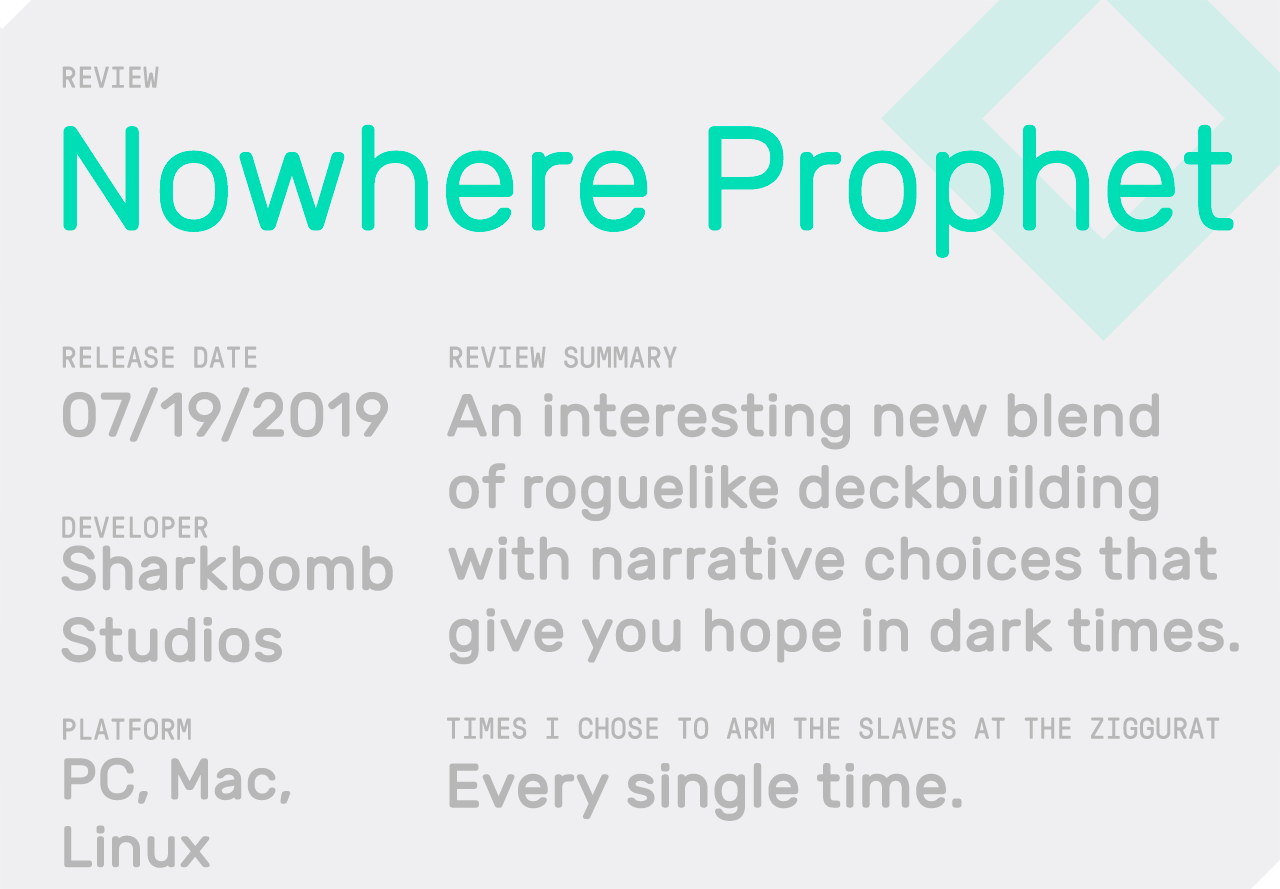
Over time Nowhere Prophet reveals itself to be a hopeful game. As you progress and your resources run thin, you’re continually given choices to act in good faith that don’t always result in a worse outcome. Even if your choices lead you to a fight, if you acted altruistically you’re rewarded with Altruistic mindset points. Even when a different, cruller choice would have resulted in an easy gain of food or currency, the game makes sure that by the end of your journey you are repeatedly rewarded for having a high score in whichever mindset you’ve focused on. Your choices to make hard sacrifices for the good of more people will often come back, in an almost karmic way, to help you in the long run. That is, if you survive long enough to see your plans through.
It can be easy to fall into the cynical trope of a post-apocalypse where trust and belief in your fellow humans will get you killed. But Nowhere Prophet is an engaging game that allows you to hope in a harsh world.. Yet at the same time, it’s never a pure power fantasy: The world feels dangerous and oppressive, yet gives you the opportunity to create a community with ideals often treated at as “weak” in post-apocalyptic media. In a world like ours, that balance between harshness and hope, is more resonant than ever.
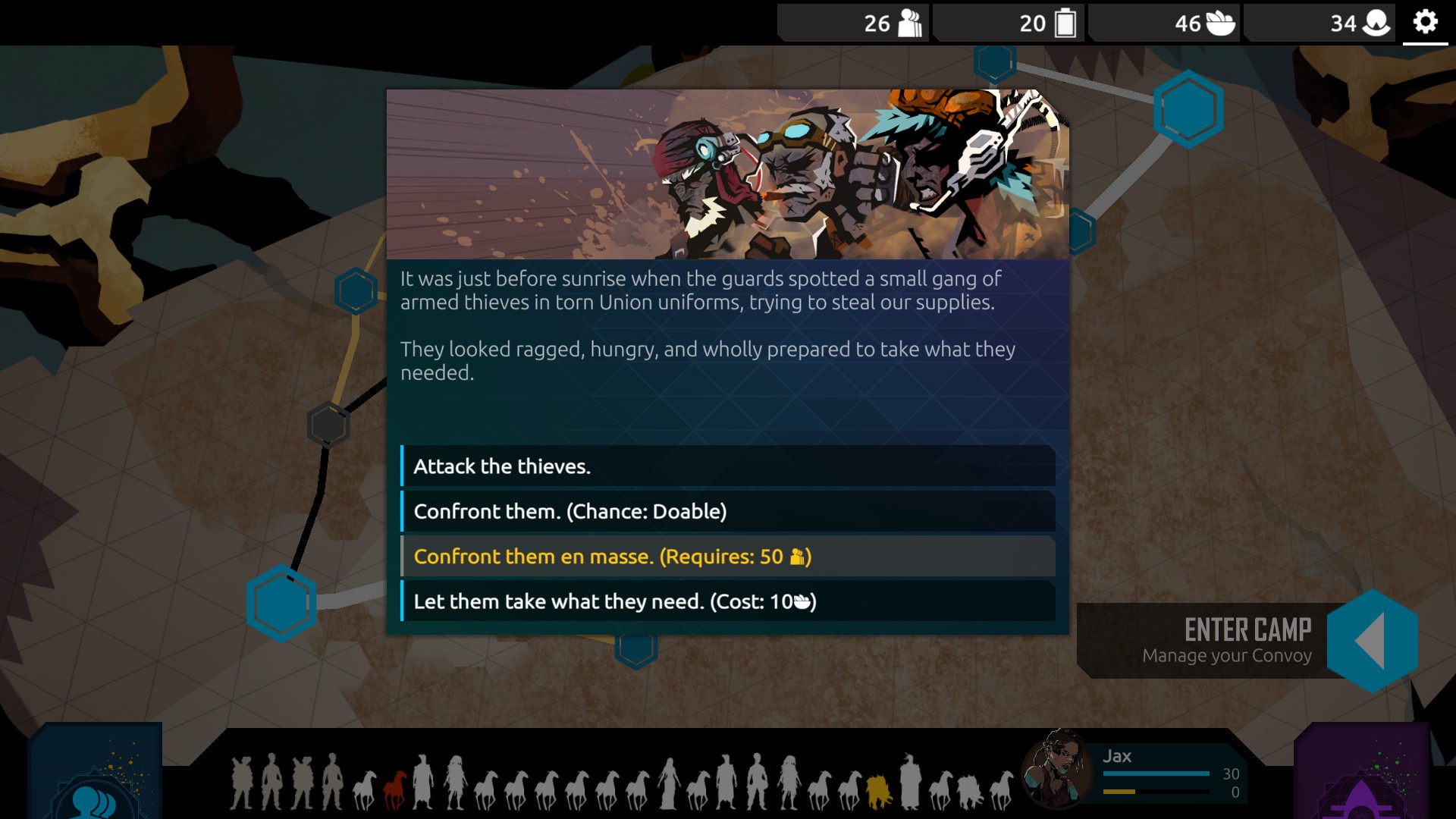
It’s been a month since we lost Nabhya. We forged on, stopping only long enough to perform basic funerary rites. People were still on edge, looking around every rock and tree we passed, making sure we wouldn’t be ambushed again.
One night, there was a commotion coming from one of our storage wagons. Bhaga had found a pair of bandits rifling through our food stores. They looked emaciated, and had obviously not eaten in quite some time. “Let them go, Bhaga.” I offered them a seat around our campfire. After a moment of hesitation they agreed and sat by the fire. I served them a bit of our dinner, and they devoured it. They looked satisfied, for what I can only imagine is the first time in ages.
I told them about our journey, and how we hoped to make the world a better place for everyone. They asked if they could join and offered to help us. We welcomed them with open arms. Our community had grown, and even if we don’t reach our goal, I can feel proud to have changed the lives of at least these two people.
Have thoughts? Swing by the Waypoint forums to share them!
from VICE https://ift.tt/2Kx0N8X
via cheap web hosting
No comments:
Post a Comment